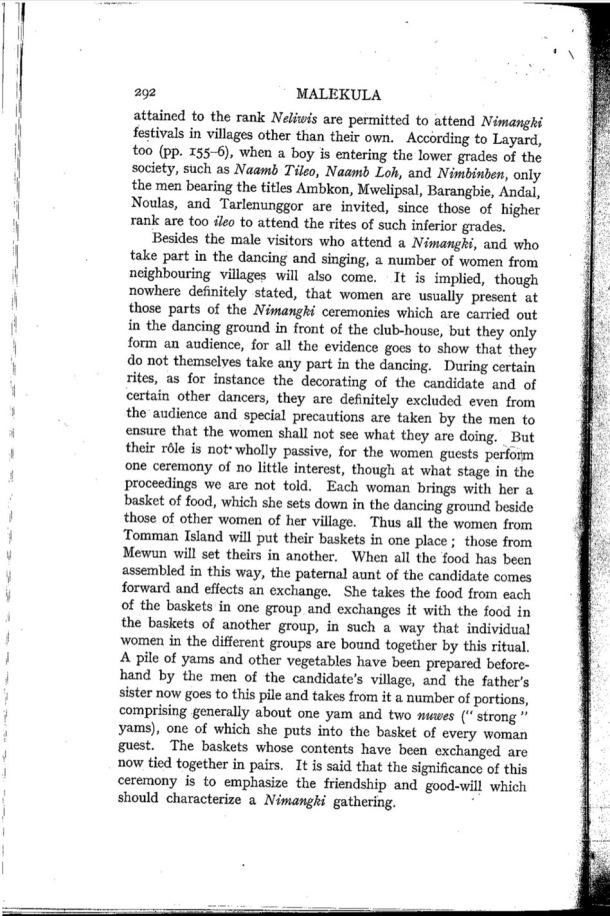|
|  [Note: this transcription was produced by an automatic OCR engine]
292 MALEKULA
attained to the rank Neliwis are permitted to attend Nimangki
festivals in villages other than their own. According to Layard,
too (pp. r55—6), when a boy is entering the lower grades of the
society, such as Naamb Tilea, Naamb Loh, and Nimbinbm, only
the men bearing the titles Anibkon, Mwelipsal, Barangbie, Andal,
Noulas, and Tarlenunggor are invited, since those of higher
rank are too ileu to attend the rites of such inferior grades.
Besides the male visitors who attend a Nimangki, and who
take part in the dancing and singing, a number of women from
neighbouring villages will also come. It is implied, though
nowhere deï¬Ånitely stated, that women are usually present at
those parts of the Nimangki ceremonies which are carried out
in the dancing ground in front of the club-house, but they only
form an audience, for all the evidence gocs to show that they
do not themselves take any part in the dancing. During certain
rites, as for instance the decorating of the candidate and of
certain other dancers, they are deï¬Ånitely excluded even from
the audience and special precautions are taken by the men to
ensure that the women shall not see what they are doing. But
their rble is n0t'wholly passive, for the women guests periomn
one ceremony of no little interest, though at what stage in the
proceedings we are not told. Each woman brings with her a
basket of food, which she sets down in the dancing ground beside
those of other women of her village. Thus all the women from
Tomman Island will put their baskets in one place ; those from
Mewun will set theirs in another. When all the food has been
assembled in this way, the paternal aunt of the candidate comes
forward and effects an exchange. She takes the food from each
of the baskets in one group and exchanges it with the iood in
the baskets of another group, in such a way that individual
women in the different groups are bound together by this ritual.
A pile of yams and other vegetables have been prepared before-
hand by the men oi the candidate's village, and the father's
sister now goes to this pile and takes from it a number of portions,
comprising generally about one yam and two mu/es (" strong "
yams), one of which she puts into the basket of every woman
guest. The baskets whose contents have been exchanged are
now tied together in pairs. It is said that the signiï¬Åcance of this
ceremony is to emphasize the friendship and good-will which
should characterize a Nimangki gathering. ‘
¢J,
we
fl
e-
‘ v.,.
7
*~
M
1»
I ,‘
.
|